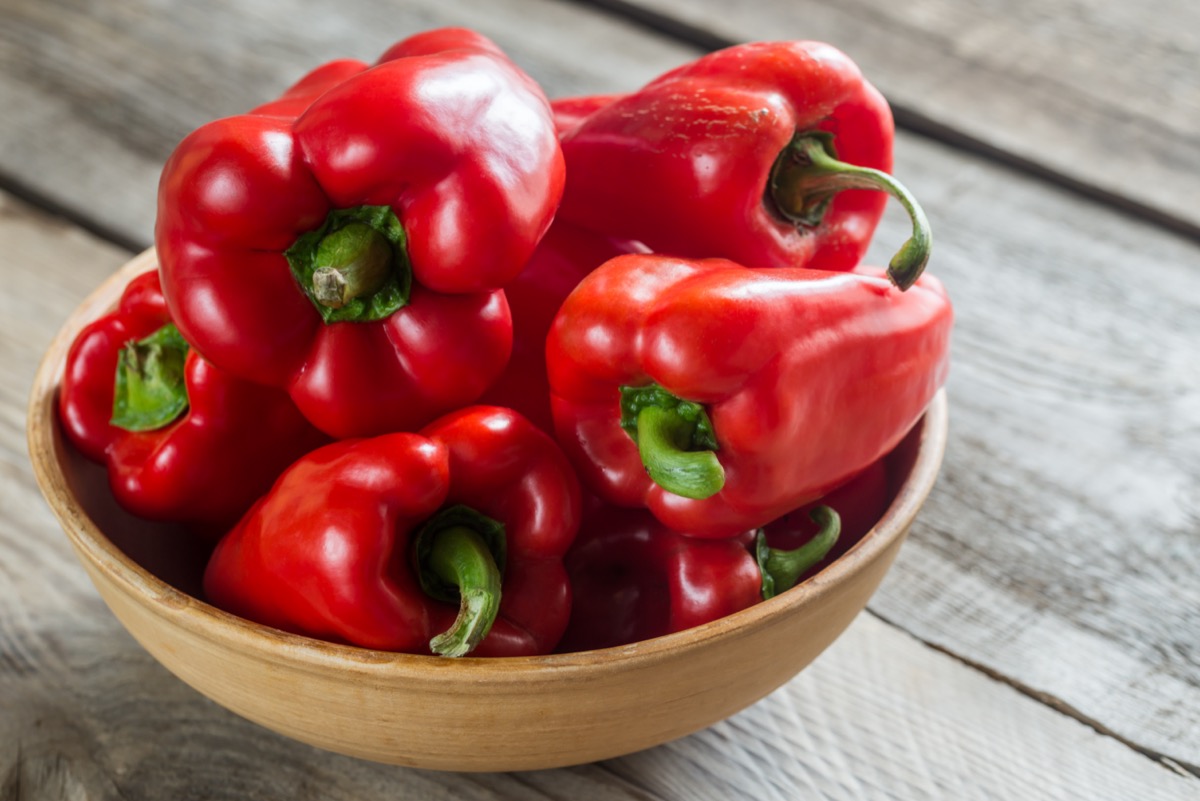7 Science-Backed Benefits of Eating Bell Peppers

Whether you're sautéing them to throw in a stir fry, or making this low-carb pizza recipe, bell peppers are a delicious part of many different types of meals. Bell peppers also make for great snacks to take on the go and make for a healthy way to enjoy your favorite dips and sauces. Thankfully, along with this vegetable being convenient and delicious, there are many bell pepper benefits that directly impact your health.
While there are unique qualities to bell peppers that provide a helpful combination of health benefits for you to enjoy, it's also important to focus on getting enough of a variety of vegetables in your diet in general because there isn't just one miracle vegetable that can provide everything your body needs, according to Harvard Health.
If you're a fan of bell peppers and want to incorporate them into more of your meals, we highly recommend reading our list of science-backed bell pepper benefits that come from chowing down on this nutrient-rich snack. Then, for more healthy eating tips, make sure to check out 7 Vegetables That Reduce Inflammation and Slow Aging.
Lycopene in bell peppers may help fight cell damage.

Bell peppers contain a natural pigment called lycopene, which can also be found in watermelon, tomatoes, guava, and pink grapefruit. Out of all the colors of bell peppers, the red variety is by far the richest in lycopene. But what does this natural plant compound do for your health?
According to a report published in Nutrients, lycopene is one of a few different plant pigments that has been found to potentially help fight free radicals in the body. Free radicals are compounds that can cause damage to your body's cells, which creates oxidative stress that can lead to disease. This report states that lycopene helps keep free radicals at bay, and therefore may be able to help reduce the risk of cardiovascular issues.
Their carotenoids may benefit eye health.

Yellow and orange bell peppers contain two natural pigments called zeaxanthin and lutein, which are also classified as carotenoids. These carotenoids, which are also found in many naturally yellow and orange foods like cantaloupe, carrots, eggs, and salmon, have been found to benefit your health in numerous ways.
For instance, according to a report published in Nutrients, these naturally occurring pigments can help your eye health. The report states that lutein and zeaxanthin are a part of the pigment found in the yellow spot around your eye's retina—a spot known for helping to protect against blue light. Not only that, but these pigments can apparently also help to protect against cataracts and age-related macular degeneration.
Red bell peppers are rich in vitamin C.

Bell peppers are loaded with vitamin C. In fact, bell peppers actually have more vitamin C than oranges! Something that many people don't know about vitamin C is that aside from its health benefits like building immunity and managing high blood pressure, it has actually been proven to help cognitive function as we age.
One study review published in BMC Psychiatry was able to make a link between vitamin C deficiency and feelings of depression and slower cognitive function. While researchers claim that further research should take place, there have been multiple studies to show the links between vitamin C and cognitive function over the past 20 years—including this cohort study found in the American Journal of Epidemiology, which proved that vitamin C can protect against mild to severe cognitive impairment.
Bell peppers may help boost your immunity.

Taking care of your immunity is an essential part of keeping your body healthy. Bell peppers contain a solid amount of vitamin A, which is known to help with our immune system strength.
Most researchers have agreed that adequate amounts of vitamin A can help protect us from infectious diseases, but the reason behind this is still up for debate. According to the Annual Review of Nutrition, it could be because vitamin A deficiency hinders our ability to absorb nutrients through the regeneration of certain intestinal barriers after infection. Vitamin A is also required for the building of important cells that fight against infectious diseases.
Bell peppers are an excellent source of vitamin B6.

Another benefit that some people may not expect from foods like bell peppers is that they can actually boost your mood. Red bell peppers contain over 35% of your daily value of vitamin B6, a vitamin known to improve mood and reduce the risk of depression. According to a study published in the Journal of Inherited Metabolic Disease, vitamin B6 can be used as a supplement to help with depression symptoms. However, it's important to note that we can't get large enough levels of B6 in just bell peppers alone, so it should never be used as a means of treating depression.
They contain a nutrient that can help boost metabolism.

Bell peppers, specifically red bell peppers, contain a natural compound called capsanthin. This compound creates a red color in food and can also be found in cayenne peppers, chiles, and paprika. Although more research still needs to be done on this topic, scientists are beginning to discover that the consumption of capsanthin can help with inflammation and weight loss.
One study found in Food Research International used mice to study the effects of capsanthin on weight loss. The mice in the study not only experienced a loss in body weight, but their levels of glucose and cholesterol significantly decreased. However, Amy Goodson, MS, RD, CSSD, LD author of The Sports Nutrition Playbook and member of our Medical Expert Board notes that "Capsanthin helps with potentially causing a very small increase in metabolic rate, and that you likely cannot get the entire amount you need to boost your metabolic rate from bell peppers alone."
They contain another nutrient that plays a role in lowering blood pressure.

Bell peppers contain a natural color pigment called quercetin. This pigment is part of a group of flavonoids, and it acts as a powerful antioxidant in the body. Quercetin has been linked to many different health benefits, including anti-inflammation, fighting cancer cells, reducing the risk of heart disease, and lowering blood pressure.
A study from the British Journal of Pharmacology experimented with giving rats different levels of quercetin over a five-week period. The rats experienced a decrease in blood pressure by an average of about 23%. These are promising findings, however, Goodson adds that "This particular study used a dose of 10 milligrams of quercetin and 3.5 ounces of green bell pepper only has 2 milligrams," she says. So yes, bell peppers can help us get some helpful nutrients in our system that may lead to improved blood pressure, but we certainly can't expect bell peppers to do it on their own.
A previous version of this story was published on August 10, 2021. It has been updated to include additional copy and proofreading revisions, additional research, and updated contextual links.









